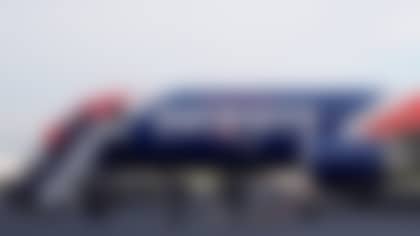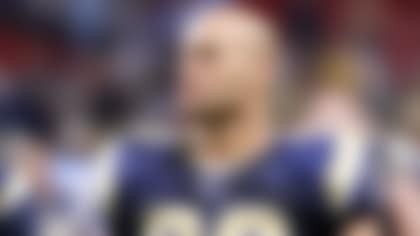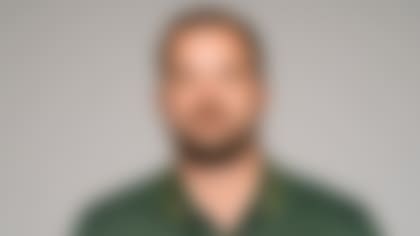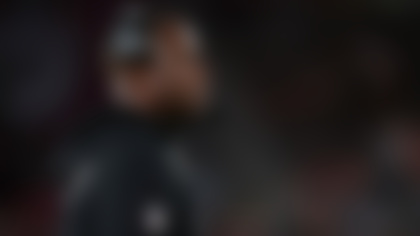Editor's note: This is one in a series on new technology being developed by the leading football-equipment manufacturers. None of the products mentioned in this article are endorsed by the NFL.
By Bill Bradley, contributing editor
Schutt Sports has been producing sporting goods for almost a century. However, only during the past decade has the company started to make its mark on football players with lighter helmets that use space-age padding.
Glenn Beckmann, director of marketing communications for Schutt, said he has seen growth in the company recently with the expiration of the NFL's exclusive contract with another helmet manufacturer. He expects more people than ever to talk about Schutt helmets in the coming season.
Beckmann this week talked with NFL Evolution about the company's history, its appeal to college and pro players and its mission to make better helmets for youth football players.
How did Schutt get started?
One of the tasks when my team started was to rebrand the company because we were making a great product but few people knew about our product. Schutt Sports started in 1918 in Litchfield, Illinois, a small town midway between St. Louis and Springfield, Illinois. It got its start as a basketball company. Bill Schutt, the founder, actually invented the little eyelets that you use to attach basketball nets to the rim. He was a metal worker and later he started tinkering around with metal faceguards for old leather football helmets. He sold the company. It was a family-owned company for three generations until mid-1980s when Julie Nimmons took over and she really is the one that orchestrated the move into football helmets. She was recently elected into the Sporting Goods Hall of Fame.
Prior to the mid '80s we weren't into football and we bought the intellectual property and the physical helmet assets of Bike Sporting Goods. That's how we got into helmets. That started our first helmet line that we turned into a helmet called the Pro Air II and the Air Advantage. In the years since then we've become the biggest helmet maker in the world thanks to the investment by Julie. Now, we're a full-out protective gear company. We make football helmets, shoulder pads, protective padding, batting helmets for baseball and softball and catcher's gear.
In Virginia Tech's latest STAR ratings for helmets, Schutt had the two highest-rated helmets for head protection in the Air Pro XP and the Vengence models. What makes Schutt helmets so special?
When you look at a football helmet -- beyond the obvious aesthetic differences -- a helmet is just a piece of plastic. The difference is made by what's inside. Like we say, it's what's inside that counts. What really sets the Schutt product apart is our approach to doing what helmets are supposed to do and that's to protect the skull and absorb impact. We're the only major helmet manufacturer to have advanced beyond the traditional padding that you've seen in football helmets since the 1970s. We use a proprietary patented system in our helmets called TPU, which stands for thermoplastic urethane. That TPU cushioning has been proven by independent testing the last three years to absorb impacts under a wider range of temperatures than any other helmet on the field.
That's what sets Schutt apart. It's our approach to absorbing impact. The other thing that sets us apart as a company is our position in the marketplace as a leader. We really try to take it upon ourselves to set straight some of the questionable information in the marketplace. In the last four or five years, we have seen an explosion of different products and different marketing claims about reducing concussions in football players. As a company, we will never make a claim that we will reduce the risk of concussions. We do not want to create a false sense of security in a player, a coach or a parent that they are going to reduce the risk of a concussion. Every person, every company that participates in football today, we all agree that there is no such thing as a concussion-proof helmet. However, there are some companies that will really push the boundaries of what we consider ethical marketing. They'll tell you that they will reduce the risk of concussions by "X"-percent or you are "X"-percent less likely to receive a concussion if you wear this helmet. Or even academic studies that say, "This helmet A is 'X'-percent better than helmet B." We simply don't believe that.
Why is that?
We think the conclusions being drawn are just a little premature. Essentially we don't think helmets can really reduce concussions directly, simply because there are so many things that can cause concussions that helmets have no effect on. As of right now, helmets don't do anything to prevent rotational forces. A lot of times researchers or doctors believe it's the torqueing of the neck and the spinning of the head that is causing most of the concussions in football. And helmets don't do anything about that. They don't do anything for duration of impact. Helmets don't address any genetic factors -- there's a pretty engaging body of evidence that shows that there may be a concussion gene just like there is an alcoholic gene -- that in some way people are predisposed to suffering concussions than others. For us, it's just too much of a leap to say, "Because our helmets absorb more impact, we believe that our helmets reduce the risk of concussion."
Your company offers five different styles of chin straps. Why is that such an important selling point of Schutt helmets?
... It's because players, coaches and managers were coming to us and asking us to develop something. They were finding shortcomings in the product that was currently on the market. They came to us and said, "Can you develop a six-point chin strap? Can you develop a short and long chin strap? Can you develop a hard cup chin strap?" … One of our hallmarks as a corporation is our ability to manufacture on demand. We're an American manufacturer. All of our helmets are made in the USA. Because we can do that, we can custom make helmets better than anybody else in the industry. So when an individual comes to us and asks for a certain aspect in the helmet, we'll try to develop it to see if it's a viable product.
How many NFL players use Schutt helmets?
In the NFL, we're at about 36 percent. And we have almost 50 percent of skill position players. We've grown our market share in the NFL almost 50 percent in the last five years and we anticipate that growing pretty significantly in the coming season with the termination of the (exclusive) contract with Riddell as the official helmet of the NFL. Without the financial incentive for NFL teams to put their players in that helmet, I think we'll see a significant increase in our market share.
What teams are switching over to your helmets for the upcoming season?
We're receiving orders from teams that have traditionally never worn our helmets. Teams like Pittsburgh and New England have made orders. We're seeing some teams like the Miami Dolphins, Minnesota Vikings and the New York Giants that have ordered 60-70 percent of their new helmets from us.
Why is your helmet worn by about 50 percent of the NFL's skill position players?
We're the only company making the smaller traditional "standoff" helmet anymore. Essentially, the "standoff" in a helmet is the physical space between the player's skull and the shell. A large standoff helmet is kind of the norm these days, like the Riddell SpeedFlex, our Vengence model and some of the Rawlings models. The large standoff helmet has more space in there. We can put more cushioning in the helmet, so it stands to reason that those helmets would perform better in terms of impact absorption. The Air AP -- because some players still like that old school spherical look with not a lot of edges on the helmet -- attracts a lot of skill position players because it is lighter. With the titanium faceguard, it weighs less than three pounds. Those particular athletes all want to be fast as they possibly can with as wide a field of vision as they possibly can get. That's why those skill position players are really attracted to that helmet.
What's next on the drawing board for Schutt Sports?
We're always looking for new ways and new materials to create our products. We just recently introduced a new padding system for youth football helmets. We are 100 percent dedicated to eliminating traditional foam padding from our youth helmets. We are getting better at it to the point where we can start doing that at the lower price-point helmet in the youth category. We just started doing that in a system we called Energy Lock Technology. That features a material called D3O. That's an engineered polymer out of England that's a phenomenal. It's not TPU, but it's a dramatic improvement over foam and it's easily the best absorbing youth football helmet in the entry-level category. We introduced that last year. We're always looking for new ways to improve old products and ways to add value to what's out there.



